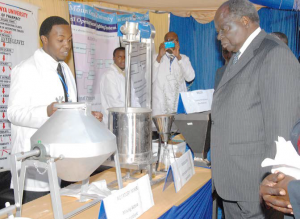MKU goes into history as the first private university to successfully train pharmacists in Kenya since independence. Somewhere in the State of Georgia, USA, one Dr Jimmy Mulu Wambua is preparing to undertake his registration exam to enable him practice pharmacy in the US. He flew to the US in July to pursue his dream of becoming a top pharmacist.
Dr Wambua is an alumnus of MKU’s pioneering Bachelor of Pharmacy class of 2009 that claimed a special place in the university’s and country’s annals of medical training history.
These first graduates of the five-year Bachelor of Pharmacy programme graduated in December 2013 during MKU’s 5th Graduation Ceremony.
Of the 84 who graduated, 47 immediately embarked on the process of becoming registered to practice as pharmacists. The rest are at various stages of the process.
Upon graduation, the MKU pharmacy graduates sat the mandatory Stage 1 Pharmacists Pre-Internship Examinations. Those who passed were posted by the Ministry of Health for a one-year paid internship in community pharmacy practice (3 months), industrial pharmacy internship (3 months) and Hospital pharmacy practice internship (6 months). The Graduates were then examined a second time by the Pharmacy and Poisons Board (PPB) after internship in the Stage 2 PPB Pharmacists Pre-registration Examinations. Those who passed were registered as pharmacists, and on 10 August, 2015, they were posted by the Ministry of Health to serve in various county hospitals across Kenya.
Dr Wambua, a Kenyan born and raised in the US for 20 years, bucked a common trend when he decided to travel to Kenya in 2009 to undertake his Bachelor of Pharmacy degree course. As is the norm, thousands of Kenyans usually travel to the US, the United Kingdom, India, South Africa and Uganda among other destinations for their university education.
Now here was a Kenyan already living in the land of opportunity but who sought education back home.
Dr Jimmy Wambua notes that the motivation to return to Kenya to pursue his pharmacy degree was largely based on the affordable fees that MKU was charging as compared to pursuing a similar programme in the USA.

of a mixer at the pharmacy stand during the University Charter Award Day
“In MKU, I was paying roughly Ksh312,000 per year, while the same programme in the US costs about Ksh2.5 million per year on average” he says.
The other key consideration was the duration of the programme. The MKU Bachelor of Pharmacy programme, being a five-year course, met the minimum duration accepted in the United States.
Had he wanted, Dr Wambua would be working in Makueni County where the Ministry of Health had posted him. When he arrived in Kenya, he received a cultural shock, having lived in the US his whole life. “From the food, to the language, to the showers, to the people, even greetings, were all so different,” he recalls.
He was privileged to serve as class representative from second to fourth year.
“I had practised as a pharmacist tech-nician before coming to MKU,” says he. “But I really gained a lot of valuable knowledge, which was much deeper than I knew because of the theoretical work and knowledge I had learned in class. So now, returning to the same pharmacy I was working in before, I am at a whole new level in knowledge and experience, which I believe will make me one of the best pharmacists in the company.
“Armed with a Masters’ degree and experience from the US as a pharmacist, I will come back to practice in Kenya with new knowledge and experience. That may be useful to society as Kenya and the Pharmacy practice continues to develop.”
His quest to fulfill a longstanding dream mirrors the journey of hundreds of others who found an academic haven in MKU.
Dr Geraldine Wanja, a classmate, is the hospital pharmacist at the Matuu sub-county hospital where she heads a department of eight, all men.
Hers too, has been an illustrious journey.
Having lost both parents early in life, she depended on her grandparents to see her through university. She scored a B at KCSE. However, she was not admitted for a pharmacy degree under the then Joint Admissions Board (JAB).
She qualified for the Module II programme at the University of Nairobi, but the fees was out of the reach of her elderly grandparents. She joined MKU, whose fees they could afford. The rest is history for the Class of 2009.
In 2010, another batch of students joined the MKU Bachelor of Pharmacy programme.
Dr James Githinji was in this lot. By then a diploma holder from the Kenya Medical Training College (KMTC), he found the university a convenient avenue through which he could pursue his degree. MKU opened an avenue that previously did not exist for continuous professional development for Diploma holders in not only pharmacy training, but in many of the health sciences, such as clinical medicine and dental technology.
Dr James Githinji is one of the beneficiaries of this increased access for career and professional development.


